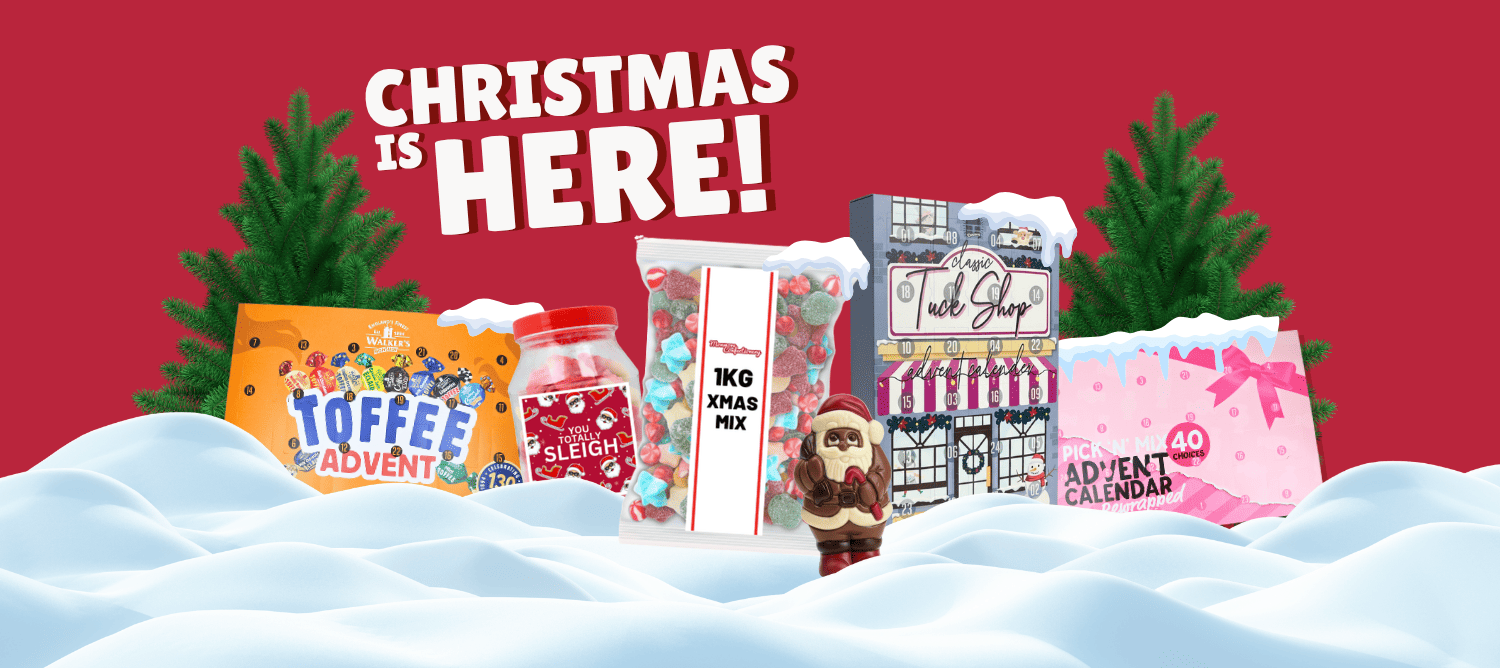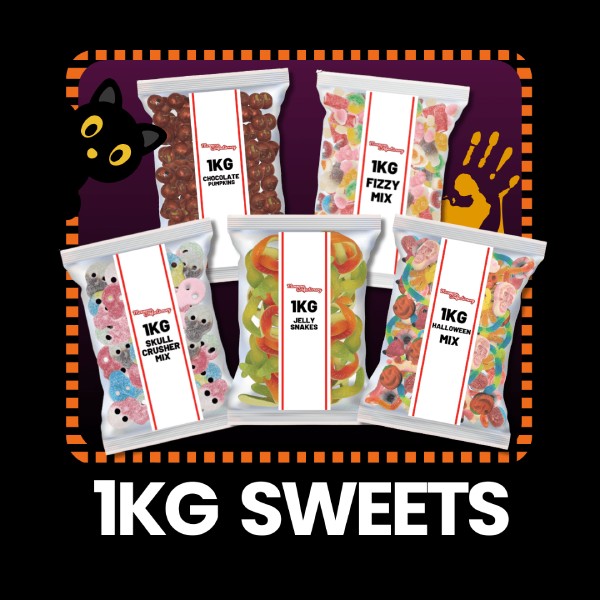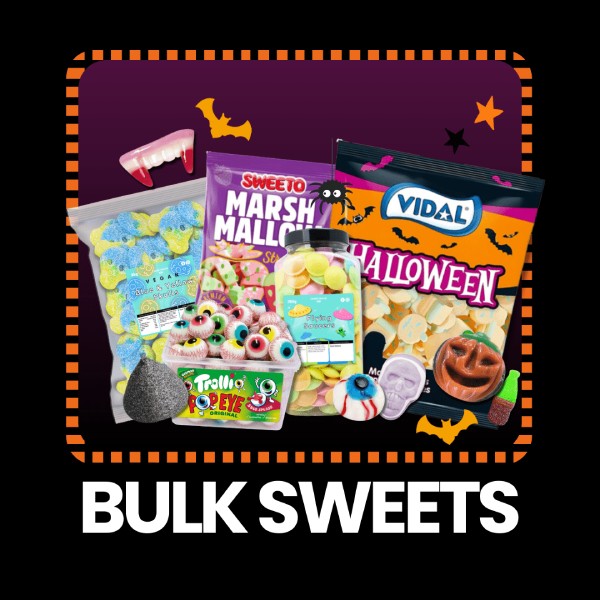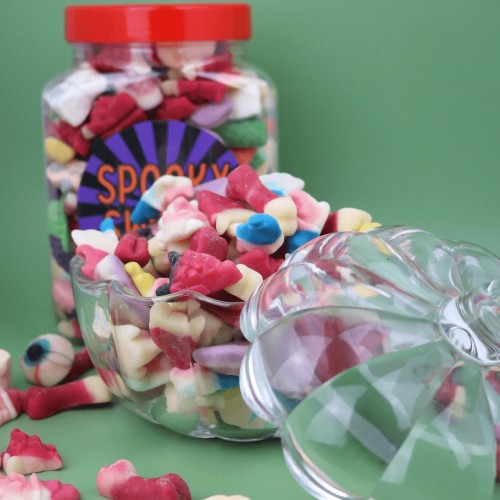Christmas Sweets & Gift Range 2025
Shop all our festive sweets and build your Christmas display to give your customers a real treat!
With a large range of bulk sweets available, as well as sweets that are perfect for stocking fillers, we have it all this year.
Stock is limited, so order now to avoid disappointment.
Best Selling Christmas Sweets
@monmoreconfectionery This is your sign to get into the festive spirit! ✨🍭 Check out our Vidal Christmas Lines. 🎅🎄❄️ #christmas #christmastiktok #christmasdecor #christmascountdown #vidal #sweets #fizzysweets #jellysweets #platter
♬ original sound - Monmore Confectionery
Why Is Christmas On 25th December?
The exact reason Christmas is celebrated on December 25th is not mentioned in the Bible, but historians and theologians believe the date was chosen for a few key reasons. One major theory is that early Christians wanted to associate the birth of Jesus with existing pagan festivals.
The Romans celebrated the winter solstice on December 25th with a festival called Dies Natalis Solis Invicti, the "birthday of the unconquered sun." By celebrating the birth of Jesus, "the Son," on the same day, Christians could give the holiday a new, spiritual meaning while appealing to people already accustomed to this time of celebration.
Another theory, the "calculation hypothesis," suggests the date was chosen for theological reasons. Some early Christians believed that Jesus was conceived on March 25th, the same day he was crucified. Nine months after this date would place his birth on December 25th.
Regardless of the exact reason, the celebration of Christmas on December 25th became widespread in the 4th century. The first recorded celebration on this date was in Rome in 336 AD. This blend of theological belief, cultural adaptation, and symbolic meaning is why we celebrate Christmas on this particular day.

Featured Christmas Sweets

Why Do We Give Gifts At Christmas?
The tradition of giving gifts at Christmas is a practice deeply rooted in history, with origins that are both religious and cultural. At its heart, the custom is a reflection of the generosity and spirit of giving that defines the holiday season
The most widely cited reason for Christmas gift-giving is the biblical story of the Magi, or Three Wise Men. The Gospel of Matthew tells how these wise men traveled from the East to find the newborn Jesus, guided by a star. Upon finding him, they "bowed down and worshiped him" and "opened their treasures and presented him with gifts of gold, frankincense, and myrrh." These valuable offerings were not just a sign of wealth but held deep symbolic meaning: gold represented Jesus’s kingship, frankincense his divine nature, and myrrh his future suffering and death. This act of giving to the Christ child became a central and powerful symbol for all Christians to follow.
Beyond the religious narrative, gift-giving at Christmas has also been shaped by secular traditions. The Roman festival of Saturnalia, celebrated in December, was a time of feasting and exchanging small gifts like candles and figurines. As Christianity spread, the Church often adopted and repurposed existing pagan customs, giving them new meaning. This made the transition to the new faith more seamless for converts. The popular figure of Santa Claus, or St. Nicholas, also contributed to the tradition. St. Nicholas was a 4th-century bishop known for his acts of secret generosity, such as leaving coins for the poor. His benevolent nature and habit of giving gifts to those in need became a central part of the Christmas folklore, particularly in Northern Europe, eventually evolving into the modern-day Santa Claus.
In the modern era, the most popular Christmas gifts are incredibly diverse and often reflect current trends and technology. For children, toys and video games are perennial favourites, with brands like LEGO and consoles like the PlayStation and Xbox often topping wish lists. For adults, popular gifts can range from tech gadgets like smartphones, smartwatches, and headphones to more traditional presents like clothing, perfume, and jewelry. Experience gifts, such as tickets to a show or a weekend getaway, have also grown in popularity as people value creating memories over material possessions. The most cherished gifts, however, are often those that are thoughtful and personalized, showing that the giver has put time and effort into understanding the recipient's interests and desires.

Trending This Year
Buying Christmas Sweets and Gifts From Monmore Confectionery
Wholesale Christmas confectionery to help retailers drive footfall, increase basket value and boost online sales — from the UK’s top-rated sweet wholesaler.
Christmas is one of the busiest and most profitable times of the year for retailers across the UK. From bustling high streets to online stores, customers search for perfect gifts, festive treats and stocking fillers that bring joy to family and friends. Sweets — with their broad appeal, nostalgic pull and affordable price points — are one of the most reliable categories for seasonal sales.
Why wholesale Christmas sweets are essential
For shop owners, garden centres, gift shops, convenience stores and e-commerce sellers, stocking up on Christmas sweets and gifts is not merely optional — it’s a strategic necessity. Buying wholesale gives retailers the stock levels, variety and margins needed to compete in the busy festive months. Here are the main reasons why wholesale confectionery should be at the heart of your seasonal planning.
1. Drive footfall to physical stores
Festive, eye-catching displays of sweets attract impulse shoppers. Bright tubs of Haribo, novelty Vidal items or Candy Crave gift packs draw attention and encourage customers to step inside. Buying in bulk allows retailers to price competitively while maintaining margins — a well-stocked Christmas display at the front of your shop becomes a magnet for shoppers and can increase basket size as visitors browse other ranges.
2. Boost online sales
Christmas is the golden quarter for online retailers. Sweets are often bought as gift-ready items, particularly when bundled or presented in hampers. Purchasing wholesale from Monmore Confectionery lets you create your own gift bundles and hampers (mix-and-match tubs, candy canes, novelty pouches) while keeping costs low. Offer gift wrapping, personalised notes or themed bundles to stand out and convert more visitors into buyers.
3. High-margin impulse buys
Confectionery consistently performs as an impulse category — affordable, desirable and easy to add at the till. Stocking small-format sweets and novelty packs gives you multiple opportunities for upselling. When bought in bulk, these small items deliver strong margins and predictable turnover through December.
4. Meet customer expectations for variety
Customers expect choices at Christmas: different flavours, packaging styles and price points. Wholesale suppliers provide the breadth retailers need without complicating purchasing. With Monmore’s extensive festive range you can satisfy budget-conscious shoppers and those seeking premium gift options alike.
Why choose Monmore Confectionery?
Reliability matters during the busiest trading period of the year. Stock shortages, late deliveries or inconsistent product quality can damage sales and reputation. Monmore Confectionery offers the experience and service retailers rely on at Christmas.
- Over 25 years’ experience: Two-and-a-half decades in the trade means we understand seasonal peaks, product trends and how to keep shelves moving.
- Top-rated on Trustpilot: We’re proud to be the top-rated sweet wholesaler on Trustpilot — thousands of customers rely on our service and product quality.
- Extensive festive range: We stock bulk Christmas sweets and seasonal lines from leading brands including Haribo, Vidal and Candy Crave.
- Simple bulk buying: Our ordering and delivery process is designed to make restocking fast and straightforward for both independents and larger retailers.
How to maximise Christmas sales with wholesale sweets
Here are practical tactics retailers can use to make the most of a wholesale Christmas confectionery supply.
Create festive displays
Presentation sells. Use a dedicated display at the front of the shop or near tills to capitalise on impulse purchases. Combine tubs, novelty items and small packs to attract different buyers.
Offer bundles and hampers
Wholesale pricing enables you to curate gift sets that sell at a premium. Pair best-selling tubs with themed items to create easy-to-sell hampers for online and in-store customers.
Promote stocking fillers
Small packs labelled as “stocking fillers” or “under £5” convert quickly. These impulse buys are ideal for parents, grandparents and colleagues looking for inexpensive gifts.
Use seasonal marketing
Feature limited-edition flavours, run “3 for 2” promotions and promote gift-ready options on social channels and email campaigns. Seasonal storytelling — emphasising nostalgia and gifting — works particularly well for confectionery.
Keep stock moving
Order in bulk to avoid running out during peak days. Wholesale buying gives you the flexibility to run offers and maintain attractive prices without eroding margins.
The power of wholesale at Christmas
Success at Christmas comes down to preparation, supplier reliability and product choice. Buying wholesale sweets helps retailers secure better margins, offer variety, and ensure stock is available when demand peaks. Sweets are timeless — they appeal across generations and are the ideal product for a season focused on sharing and gifting.
Conclusion
Stocking up on the right confectionery can make a real difference to seasonal performance. With over 25 years’ experience, a reputation as the UK’s top-rated sweet wholesaler on Trustpilot and a vast range of festive lines from Haribo, Vidal and Candy Crave, Monmore Confectionery is the partner retailers trust to deliver during the busiest time of the year. Wholesale Christmas sweets are not an optional extra — they’re a proven driver of footfall, impulse purchases and online sales.
Stock up with Monmore Confectionery












